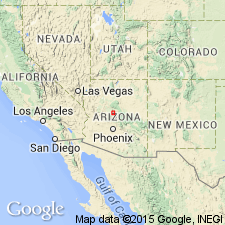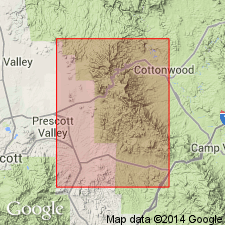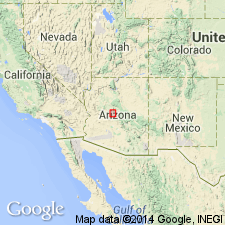
- Usage in publication:
-
- Deception porphyry
- Modifications:
-
- Original reference
- AAPG geologic province:
-
- Southwestern Basin-and-Range region
Summary:
Pg. 12. In Deception Gulch, at north end of Jerome area (Jerome district, north-central Arizona), where it adjoins the quartz porphyry, the nature of the material is open to question. The appearance is similar to that of known volcanic fragmentals and locally there are some obscure indications of its fragmental character. The microscopic evidence is conflicting but seems to point in same direction. But the rock resembles an intrusive igneous rock, and Finlay has named it [where?] Deception porphyry. The nature of its contact with the quartz porphyry indicates that one or both of the rocks must be intrusive. Age is Precambrian.
Source: US geologic names lexicon (USGS Bull. 896, p. 580).

- Usage in publication:
-
- Deception rhyolite*
- Modifications:
-
- Redescribed
- Dominant lithology:
-
- Sandstone
- Shale
- Rhyolite
- AAPG geologic province:
-
- Southwestern Basin-and-Range region
Summary:
Pg. 15-17, pl. 1. Deception rhyolite of Ash Creek group. As exposed in Deception Gulch and in part of Mescal Gulch, unit is a hydrothermally altered facies of rhyolitic flows and fragmental rocks. Name therefore modified to Deception rhyolite to include all rhyolitic rocks older than Grapevine Gulch formation (new) and younger than Shea basalt, dacite of Burnt Canyon, Brindle Pup andesite (new), and Buzzard rhyolite (new). A jasper-bearing facies of rhyolite present at top of unit in drainage basin of Ash Creek and in Hull Canyon. A minor facies in Mescal Gulch area contains sericitized plagioclase phenocrysts in micro crystalline groundmass. Near Jerome, outcrops are reddish hue, changing to buff and cream in Mescal Gulch, and are pale colored near Ash Creek. Most complete section exposed between Ash Creek and Black Canyon, where rhyolite is about 3,000 feet thick. Age is Precambrian (Yavapai Series). (Adopted by the USGS.)
Source: US geologic names lexicon (USGS Bull. 1200, p. 1062); supplemental information from GNU records (USGS DDS-6; Denver GNULEX).

- Usage in publication:
-
- Deception Rhyolite*
- Modifications:
-
- Geochronologic dating
- AAPG geologic province:
-
- Southwestern Basin-and-Range region
Summary:
Isotopic dating of zircon from upper part of formation in Prescott-Jerome area, Yavapai Co, AZ, Southwestern Basin-and-Range region, yields an apparent age of 1,820 +/-10 Ma. Of Precambrian age.
Source: GNU records (USGS DDS-6; Denver GNULEX).
For more information, please contact Nancy Stamm, Geologic Names Committee Secretary.
Asterisk (*) indicates published by U.S. Geological Survey authors.
"No current usage" (†) implies that a name has been abandoned or has fallen into disuse. Former usage and, if known, replacement name given in parentheses ( ).
Slash (/) indicates name conflicts with nomenclatural guidelines (CSN, 1933; ACSN, 1961, 1970; NACSN, 1983, 2005, 2021). May be explained within brackets ([ ]).

